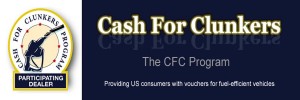
There are plenty of scammers and a few unscrupulous dealers hoping to take advantage of the Cash-for-Clunkers program - at your expense.
Jerry Milgram had long been hoping to get rid of his beat-up ’92 Ford Explorer, but with the money he was due on a trade-in, he couldn’t make the numbers work on a trade-in.
That all changed when the Cash-for-Clunker program was launched, last month. Suddenly, the Chicago plumber saw the opportunity to get a compact crossover that would significantly lower his fuel costs but still provide enough room to carry his tools to the job.
At least, that’s what Milgram thought. But when he visited a suburban Chicago dealer, he was told he’d have to sign a document requiring him to pay back the $4,500 government voucher if his old car somehow got rejected by the administrators of the Car Allowance Rebate System.
That’s just one of the scams and other dubious procedures that have popped up along with the CARS program, more commonly known as Cash-for-Clunkers. Authorities and experts are warning that motorists, hoping for the unexpected windfall payout, use the same amount of caution that they would with any high-dollar financial deal.
Identity thieves hope to take advantage of the Clunkers program, and the Queens Gazette reports that scammers have been calling owners of gas guzzlers, offering to ensure they get a “reservation” in the CARS program. Since many potential buyers likely heard that the Clunkers program has a limited amount of cash to give out, enough folks apparently are willing to suspend their disbelief, handing over critical personal information that includes the Social Security numbers identity thieves crave.
“Hang up, walk away from the phone and forget about it,” the Gazette quoted a law enforcement suggesting. “There is no such thing as a reserved spot in the government program.” The Attorneys-General of several states, including Illinois and Ohio, are already issuing warnings about potential identity theft.
In fact, the experts stress, you should make absolutely sure that the dealer you’re working with is one who has actually signed on to participate in the CARS program. Only about 16,000 of roughly 20,000 new car showrooms is actually enrolled. To find out, check the searchable database at the officials Clunkers website, CARS.gov.
Check the website to know whether your trade-in is eligible and what you’re entitled to. There are several hurdles to overcome. Not only must you improve your mileage with the trade-in, but you need to have owned the vehicle for at least a year, and you must have had continuous insurance coverage during that period.
A $4,500 voucher may sound like a good deal, but you could be in for bigger savings. Make sure your dealer advises you about any rebates and other incentives that you might qualify for. Just because you’re trading in a Clunker doesn’t offset or eliminate those additional credits. Chrysler, for example, has been offering to as much as double your Clunker cash.
Make sure you check for fees and other charges that an unscrupulous dealer might try to saddle you with. You can’t be charged, for example, with having your clunker hauled off the dealer lot – though the CARS rules require that a trade-in must be able to run.
In fact, the dealer is required to give you an additional credit for the scrap value of your car, minus $50 to cover their own effort. Make sure that’s added in on top of the $3,500 or $4,500 Clunkers credit and any additional incentives. And before you hand over the keys, remember, this isn’t a regular trade-in, so take anything that you might find worthwhile keeping, whether its floor mats, a good CD player or a GPS system. Otherwise, they’ll simply go into the crusher.
Luckily, lawmakers have given the CARS program some teeth. If your dealer tried to force you to pay him back if the government, for some reason, doesn’t accept the trade-in, you don’t have to sign such a clause. But you can call the folks administering the program and they could be subject to a $15,000 fine.
If you suspect you’re being scammed, go to the CARS.gov website, or call the National Highway Traffic Safety Administration, which administers the program, at 1-866-CAR-7891. You can report scam websites to the Federal Trade Commission, at FTC.gov, or 1-877-FTC-HELP.
By the way, dealers and identity thieves aren’t the only ones trying to game the system. There’ve been reports of some motorists trying to fake paperwork to qualify, or who try to trade in more than one Clunker. It’s one to a customer.

Identity thieves hope to take advantage of the Clunkers program, and the Queens Gazette reports that scammers have been calling owners of gas guzzlers, offering to ensure they get a “reservation” in the CARS program.